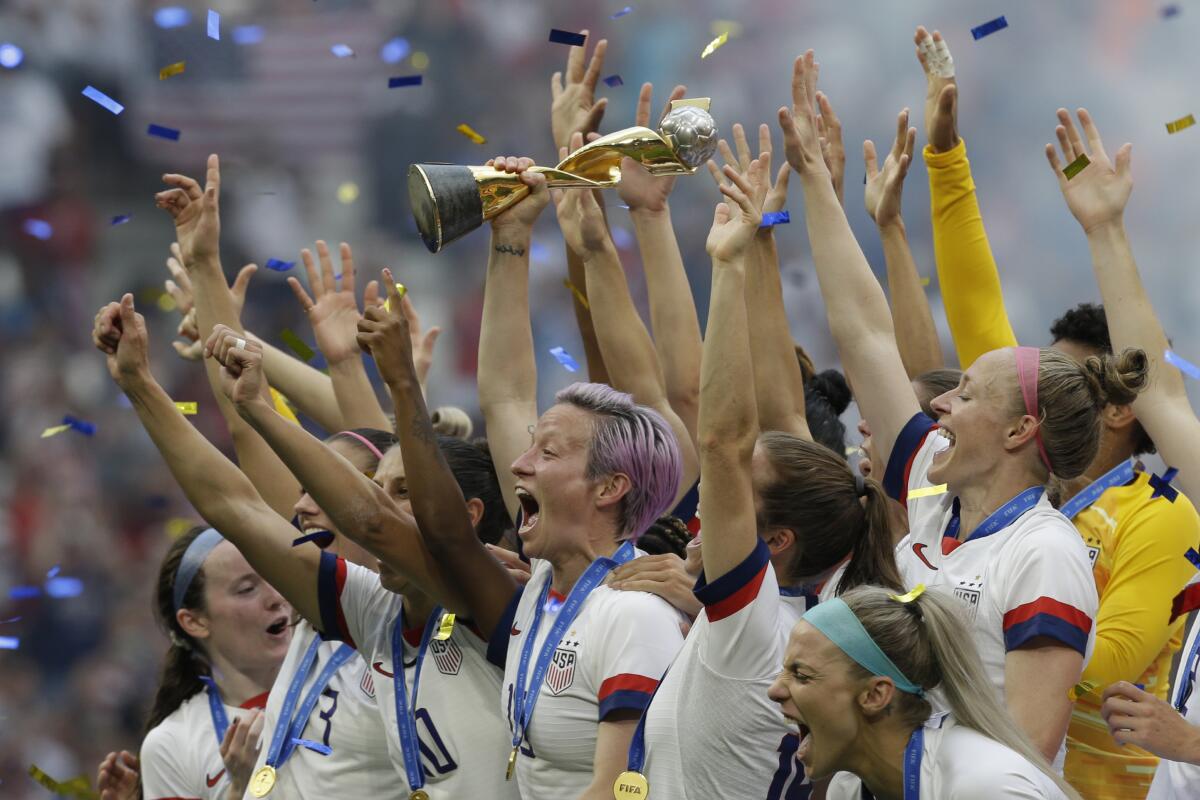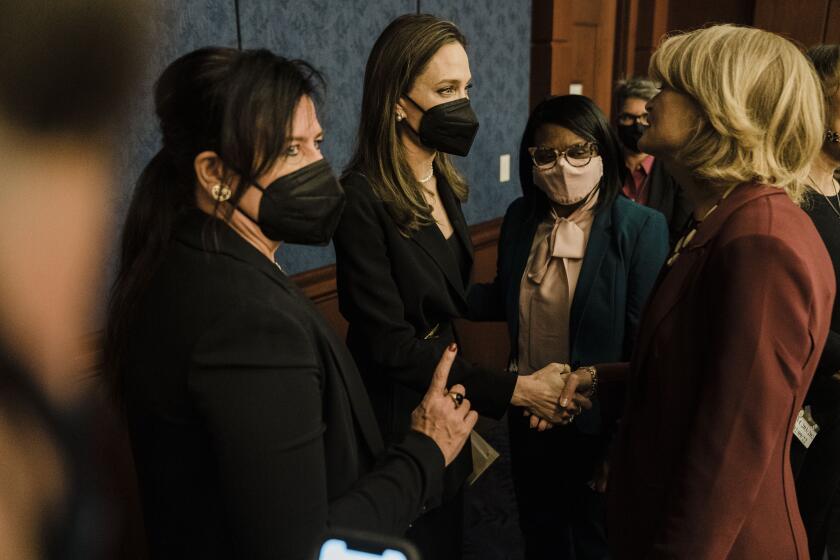Sexual harassment, name-calling, fat shaming by coaches? Just another day in women’s soccer

- Share via
There are so many disturbing allegations in last week’s bombshell report on abusive behavior and sexual misconduct in women’s professional soccer: coaches grooming players, coercing sex, bullying, retaliating for spurned advances, vulgar name-calling.
The report, commissioned by U.S. Soccer and conducted by an all-female team of investigators led by former U.S. Deputy Atty. Gen. Sally Q. Yates, zeroes in on the behavior of three male coaches, none of whom, thankfully, is still coaching professionally.
“As the season wore on,” wrote one Portland Thorns player in a 2014 survey about her coach, Paul Riley, “we got used to being called dumb, stupid, slow, idiotic, retarded, we have no balls, we will never be better than the average 16-year-old boy, worthless and the list goes on.”
And that’s the mild stuff.
In granular detail, the report recounts how the trio — Riley, Christy Holly and Rory Dames — reportedly preyed on players, psychologically, emotionally and sexually. It details how the National Women’s Soccer League, founded in 2012, and its parent organization, the U.S Soccer Federation, had no protocols in place to protect the athletes and barely does now. (The former coaches have all denied the allegations.)
The report takes pains to note that bad behavior by coaches is not limited to this threesome. Their conduct, however, was some of the most egregious, and was an open secret, according to the findings.
“Rory has been an a—hole for the entire time that I’ve known him — from the first second that I heard him on the sideline, the first season that [I] ever played,” said soccer superstar Megan Rapinoe Thursday in London. “Paul’s the same. I didn’t know Christy Holly personally, but everything I heard about him was horrible.”
For years, athletes said, they risked retaliation and career damage when they dared to report specific instances of misconduct. Yet nothing ever changed; the reports always seemed to end up in some kind of bureaucratic black hole.
Abcarian: New law doesn’t do enough to prevent the violence and abuse women face behind closed doors
Protections for victims of domestic violence and sexual assault are expanded the same week Trevor Noah calls out Kanye for ‘harassing’ Kim Kardashian.
In annual surveys, athletes complained again and again about terrible treatment and substandard living and training conditions. There was no accountability. And even if a coach was eventually fired for his abusive conduct, no public statement from the team or the league was forthcoming, investigators found. It was commonly acknowledged that he would bounce to the next team, coaching — and abusing — again.
Soccer officials, the report makes painfully clear, were focused on avoiding litigation and legal exposure, not protecting athletes, the lifeblood of their industry.
The players, three-quarters of whom until recently earned less than $31,000 a year, said they were told to keep any bad news in the family; that speaking out against coaches, teams or the league would endanger the very survival of women’s professional soccer, which has had a precarious history. They said they were told they should be grateful to be able to play professional soccer at all.
It was not until two former Portland Thorns, Mana Shim and Sinead Farrelly, shared explosive stories about Riley with the Athletic that women’s professional soccer was forced to act.
“There was not one trigger,” wrote the Athletic’s Meg Linehan. “It was incident after incident, building upon themselves, revealing the scope of the sport’s problems and leading the players to understand that the only way to bring about great change was to refuse to be silent.”
Farrelly said Riley coerced her into having sex, and that he demanded she and Shim, both of whom are gay, kiss in front of him in exchange for calling off a team “suicide drill” the next day. A few years earlier, when he coached her in Philadelphia, Riley told Farrelly that accepting a spot on the 2011 World Cup roster would be an act of disloyalty to their team, the Independence. According to the Athletic, Riley told her she deserved to be on the team, “but only if he was coaching it.”
Every once in a while, you stumble across a new word that perfectly describes where you are in life. For me, that’s kipple.
Imagine the effect that kind of gaslighting has on a player’s psyche.
Soon after the Athletic exposé, members of the Chicago Red Stars requested an investigation into their team culture and the behavior of their coach, Rory Dames. The team hired a psychologist who, according to the Yates report, “stated unequivocally that Dames’ screaming, belittling/humiliating, rejecting, and isolating players amounted to sustained emotional and verbal abuse.”
The psychologist also said that there is no proof in scientific literature that abusing players motivates them. Do we really need science to tell us that?
The report makes many recommendations about how the league and the federation must change. Chief among them is instituting a system of transparency. Teams must share information about coach misconduct, and knock off the “thanks for your service, we wish you well” departures that allow abusers to keep coaching.
And though the report focuses on what is described as a torrent of terrible behavior by professional soccer coaches, one of the most alarming observations in its entire 300-plus pages is that the phenomenon is rooted in youth soccer. Some professional coaches, including Dames and Riley, have youth soccer schools that function as pipelines to college teams.
Dames still owns the Eclipse Select Soccer Club in Chicago, where he is known for his “tirades against young girls,” according to the report, including calling his players “fat ass,” “pussy,” “retarded” and “bitches.”
Why on Earth would young players — or their parents — tolerate that?
Simple: “All of us wanted scholarships to college,” one former Eclipse player told investigators, “so we all had to deal with it.”
Even more worrisome, the report found, the more a player is abused, the more normal the abuse will seem.
“Overwhelming numbers of players, coaches and USSF staff observed that women players are conditioned to accept and respond to abusive coaching behaviors as youth players,” it says. “By the time they reach the professional level, many do not recognize the conduct as abusive.”
That thought should bring a shudder to every parent whose daughters dream of playing professional soccer. No one should have to forfeit her self-esteem to succeed in sports.
More to Read
A cure for the common opinion
Get thought-provoking perspectives with our weekly newsletter.
You may occasionally receive promotional content from the Los Angeles Times.













